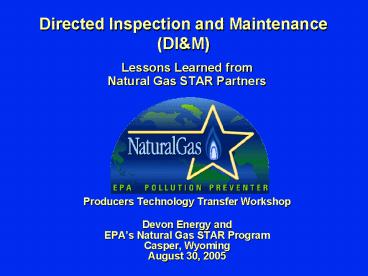Directed Inspection and Maintenance DI - PowerPoint PPT Presentation
1 / 18
Title:
Directed Inspection and Maintenance DI
Description:
Gas leaks are invisible, unregulated and go unnoticed ... A successful, cost-effective DI&M program requires measurement of the leaks ... – PowerPoint PPT presentation
Number of Views:134
Avg rating:3.0/5.0
Title: Directed Inspection and Maintenance DI
1
Directed Inspection and Maintenance (DIM)
- Lessons Learned from
- Natural Gas STAR Partners
- Producers Technology Transfer Workshop
- Devon Energy and
- EPAs Natural Gas STAR Program
- Casper, Wyoming
- August 30, 2005
2
DIM Agenda
- Methane Losses
- Methane Recovery
- Is Recovery Profitable?
- Industry Experience
- Discussion Questions
3
Natural Gas Industry Emissions
- Production sector responsible for largest portion
of emissions
Oil Downstream 2 Bcf
1 Bcf
Processing 36 Bcf
Production 148 Bcf
7 Bcf
Distribution 68 Bcf
24 Bcf
18 Bcf
Transmission Storage 101 Bcf
Inventory of US Greenhouse Gas Emissions and
Sinks 1990 - 2003
4
Oil and Gas Production Sector Methane Emissions
- The production sector has several large methane
emission sources that can be targeted for
reductions
Other Sources 21 Bcf
Storage Tank Venting 9 Bcf
Pneumatic Devices 61 Bcf
Meters and Pipeline Leaks 10 Bcf
Gas Engine Exhaust 12 Bcf
Dehydrators and Pumps 17 Bcf
Well Venting and Flaring 18 Bcf
Inventory of US Greenhouse Gas Emissions and
Sinks 1990 - 2003
5
Methane Losses by Equipment Type
Pressure Relief Valves
3.5
Pump Seals
1.9
Orifice Meters
0.1
Pressure Regulators
Other Flow Meters
0.4
0.2
Valves
Open-Ended Lines
26.0
11.1
Control Valves
4.0
Blowdowns
0.8
Compressor Seals
Connectors
23.4
24.4
Crankcase Vents
4.2
Source Clearstone Engineering, 2002
6
What is the Problem?
- Gas leaks are invisible, unregulated and go
unnoticed - Gas STAR Partners find that valves, connectors,
compressor seals and open-ended lines (OELs) are
major sources - 27 Bcf of methane emitted per year by
reciprocating compressors seals and OELs, each
contributing equally to the emissions
7
What are the Sources of Emissions?
8
How Much Methane is Emitted?
9
How Much Methane is Emitted?
10
Methane Recovery
- Fugitive losses can be dramatically reduced by
implementing a DIM program - Voluntary program to identify and fix leaks that
are cost effective to repair - Survey cost will pay out in the first year
- Provides valuable data on leakers with
information of where to look
11
What is DIM ?
- Direct Inspection and Maintenance
- Cost-effective practice by definition
- Find and fix significant leaks
- Choice of leak detection technologies
- Strictly tailored to companys needs
- DIM is NOT the regulated volatile organic
compound (VOC) leak detection and repair program
(LDAR)
12
How Do You Implement DIM?
13
How Do You Implement DIM?
Toxic Vapor Analyzer
- Screening - finding leaks
- Soap bubble screening
- Electronic screening (sniffer)
- Toxic Vapor Analyzer (TVA)
- Organic Vapor Analyzer (OVA)
- Ultrasound Leak Detection
- Acoustic Leak Detection
- Optical Leak Imaging
Acoustic Leak Detection
14
How Do You Implement DIM?
- Evaluate the leaks detected - measure results
- High Volume Sampler
- Toxic Vapor Analyzer
- (correlation factors)
- Rotameters
Leak Measurement Using a High Volume Sampler
15
DIM by Leak Imaging
- Real-time visual image of gas leaks
- Quicker identification repair of leaks
- Screen hundreds of components an hour
- Screen inaccessible areas simply by viewing them
16
Is Recovery Profitable?
17
DIM - Lessons Learned
- A successful, cost-effective DIM program
requires measurement of the leaks - A high volume sampler is an effective tool for
quantifying leaks and identifying cost-effective
repairs - Open-ended lines, compressor seals, blowdown,
engine-starter and pressure relief valves
represent lt3 of components but gt60 of methane
emissions - The business of leak detection is about to change
dramatically with new technology
18
DIM - Partner Experience
- Partner A Leaking cylinder head was tightened,
which reduced the methane emissions from almost
64,000 Mcf/yr to 3,300 Mcf/yr - Repair required 9 man-hours of labor
- Gas savings were approximately 60,700 Mcf/yr
- Value of gas saved was 182,100/year at 3/Mcf
- Partner B One-inch pressure relief valve emitted
almost 36,774 Mcf/yr - Required five man-hours of labor and 125 of
materials - Value of the gas saved was 110,300 at 3/Mcf































